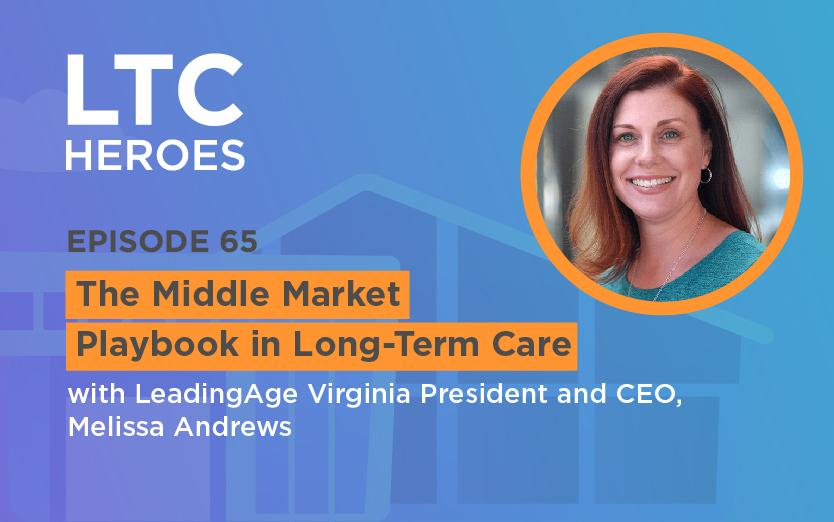In this week’s episode of the LTC Heroes podcast, we speak with Melissa Andrews, President and CEO at LeadingAge Virginia. Melissa is responsible for the overall management of the company and leading the membership.
LeadingAge represents more than 5,000 nonprofit aging services providers and other organizations that improve millions of lives daily. LeadingAge uses applied research, advocacy, education, and community-building to make the United States a better place to grow old.
The episode takes an in-depth look at Melissa’s book, The Middle Market Playbook. This was organized by Melissa back in 2019 and was published by LeadingAge.
The idea for the book started when Melissa began traveling around Virginia when she became CEO almost six years ago. She would ask members what kept them up at night.
There were two main issues: the workforce; and that many faith-based members felt like they weren’t being served well. The book was created to help solve a problem that existed for that group.
Other topics discussed in the episode include the challenges of diversity in the long-term care workforce and strategic planning.
Learn all about The Middle Market Playbook in long-term care and why it was produced, by tuning in to the latest episode of the LTC Heroes podcast with Melissa Andrews, President and CEO at LeadingAge Virginia.
Rapidfire Q/A
What are the origins of the playbook?
This idea started when I began traveling around Virginia when I became CEO almost six years ago. I would ask members what keeps them up at night, and there were two issues. One was the workforce.
The other was that many of our members are faith-based continuing care retirement communities, founded to take care of retired ministers or retired reverends. And people believe that they’re not being served.
They wanted to get back to their roots, also recognizing that a huge demographic is coming toward us with the baby boom generation that is defined as the middle market, who don’t currently have options out there. And so we wanted to solve a problem that existed for that group.
You said there might be a personal story behind this playbook. Can you explain why?
It was very personal for me. My dad is a retired DC policeman and my mom is a retired secretary. Through no fault of their own, they took out multiple mortgages on their homes over the years. They didn’t have a lot and they didn’t have a 401(k) to fall back on.
Their real long-term care plan was my dad’s pension from the DC police force.
My mom has had some chronic health conditions. And so I was concerned about them. Number one: continuing to have community without having to maintain a house and what would long-term services and support look like for them, based on them falling in this middle-market demographic?
This means that they have too much to qualify for a subsidy like affordable housing or Medicaid, but they don’t have enough to be able to move into a retirement community.
Who’s going to love the playbook?
So grateful a lot of people have read it.
I think people who want to expand their mission and want to compete with some of the for-profit, independent living rental communities that perhaps aren’t providing service-enhanced living.
I think anybody who looks at their mission and says we want to grow it and this is the market in which we would like to grow. This is something for them.
What’s next for you and LeadingAge?
One of the areas that we have started focusing on is how we support our members in their diversity, equity, and inclusion journey. We have a pilot that we’re launching in Richmond, Virginia, that will look at how we listen to people of diverse races and ethnicities and what types of services we should be creating to serve them in the future.
Because, currently, this group of members serves mostly affluent Caucasian couples or singles. So they want to create inclusive communities to serve a broader audience, and that might not be the business model they currently have. So we are doing a deep dive on diversity, equity, and inclusion with various aspects.
I will say the dreaded W word that I know we’re tired of hearing: the workforce. What is unique that we can do to support our members in this area? Is it just advocacy?
We just learned about the ‘benefits cliff.’ So basically, what that means is as you begin to pay your direct care workforce a living wage, you begin to lose state benefits.
So there’s a point in time where the more you pay them, the less they have. So we’re starting to take a look at that because our members are moving to livable wages. So that’s an area that we’re looking at.
As a leader of LeadingAge, what do you enjoy the most?
I like to think that I can inspire people to do what they do, to go back and continue doing it, and understand that they’re valued and make a difference.
I really believe in the work that we do and the difference it makes. And I want to remind people of how important each and every one of them is. I think that’s probably what I’m best at.
We appreciate you listening, and we are motivated by your feedback. Visit LTCHeroes.com to learn more about us and head to LTCHeroes.com/community to join our exclusive Facebook Group for Nurses and our exclusive Linkedin group for Long-Term Care Owners. We look forward to seeing you inside the community.
—
Sponsored by Experience.Care
This episode is brought to you by Experience.Care, the only long-term care EHR backed by guarantees.
Your profitability is our priority and your compliance, our cause. Since 1969.
Get your profitability consultation today at Experience.Care/guarantee. Our website is .Care for a reason. We care about your care. Visit us at Experience.Care.

